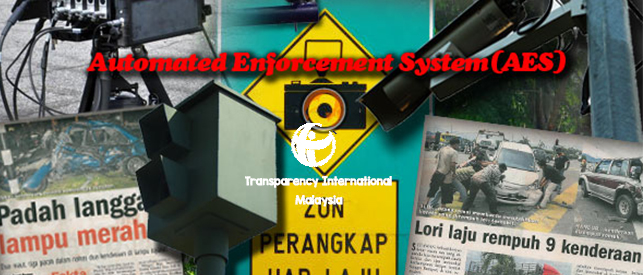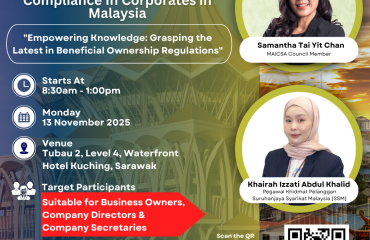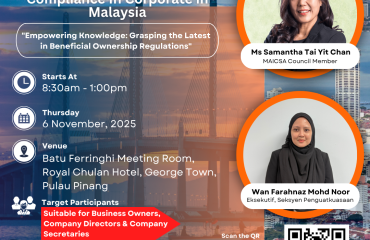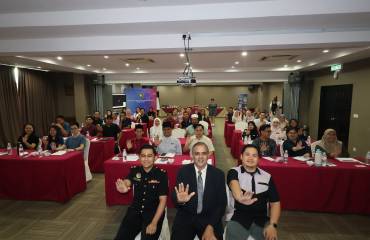
PRESS STATEMENT, 11 February 2015, KUALA LUMPUR –
- In a good governance regime, conflict of interests must be avoided at all costs by all.
- Any public policies and government projects must be undertaken with due diligence.
- Engagement with experts and authorities as well as concerned citizen groups is always good.
The high profile public-private partnership cases that are currently undergoing arbitration and dispute processes have raised further question marks instead of answering public concerns. Traffic offences monitoring system operators that were initially appointed to run the Automated Enforcement System (AES) are asking for settlement that would be controversial, if not immoral, especially in the backdrop of economic uncertainties today.
Malaysia must learn not to always be fickle-minded in public-private partnership projects like the aborted JB-Singapore crooked bridge construction project and the now deferred ‘proof of concept’ immigration registration of foreign workers system proposal.
The English saying of “closing the stable door after the horse has bolted” has some wisdom for the powers that be to reflect on. Surely the Malaysian civil service is not bereft of experts that could map out practical solutions and value for money proposals on their own without relying too much upon private entrepreneurs’ innovative ideas.
Transparency international Malaysia (TI-M) urges the proper authorities such as Economic Planning Unit (EPU) particularly its Public-Private Partnership Unit (UKAS), experts and universities to map out and review all such high profile public projects to avoid inherent conflict of interests like the current case in arbitration. Furthermore, without effective controls, proper legislation and oversight committees monitoring the transactions, there is a possibility of abuse where instead of undertaking only necessary projects those only pursued for corrupt ends become the norm.
In the current AES case it was clearly a project which involved the public and tax-payers’ funds but there didn’t seem to be any public consultation and proper evaluation of its viability. In the end the Government had to scrap it and now is faced with paying a heavy compensation which obviously will come from public funds, which really is totally unacceptable.
TI-M absolutely disagrees with the amount of compensation being discussed as reported which if at all should be kept to the minimum, and should only reimburse the concession holder for what had actually been spent without any profit element and certainly not for loss of opportunity loss since the project was terminated for the sake public interest.
In the final analysis one wonders why we need another traffic summons mechanism at all in the light of what the traffic police are already doing and the hundreds of million in fines which the government already collects annually.
On a more general noted some other pertinent points are:
– Profit gain is not the issue if elements of conflicting interests, profiteering and privileged information exploits are absent.
– Profit guarantee is a legitimate exercise for any publicly traded companies. The point is no one, least of all Government, should mislead the general public with fancy gadgets that are lacking in either adequacy or efficacy angles.
– Worse if such schemes were concocted pre-implementation but only to be denied or dismissed as nonsense after public outcry,
– Like any fraudulent or corrupt acts, the amount does not matter. The act is.
– Even when a corrupt element are not traceable, abuse of privileged information or monopolizing specific portions in the business services supply chain is worrying to say the least.
– This is especially sad if the ministerial responsibilities to safeguard public good are not rendered satisfactorily as promised.
– Bureaucratic procedures exist to help ensure due diligence and exacting specifications of promised complete works are followed through to the letter.
– Should respective parties take advantage knowingly, they must be held accountable.
– Where these breaches were honest mistakes and a matter of oversight, the grey areas must be clarified.
– Some red flags to be explained and made clear.
- Was the way the contract was awarded for the AES (Automated Traffic Enforcement) system transparent and fair?
- Do the ministers in charge know exactly the technical mechanics and cost impacts of these schemes?
- Do the bureaucrats brief and advise them of the whole thing?
- Did the experts or private companies share the PEST analysis of the scheme with the Government?
- Between the ministers, civil servants and private companies, who can assure that public interest will be protected and safeguarded at all times?
TI-M found that there are 3 top risks possibilities in terms of likelihood of the failure of this AES’s project.
- Failure of national governance (geopolitical risk)
- Public are misled (social risk)
- Fraudulent and corrupt acts (economic risk)
When will we learn? The interest of the rakyat is always paramount and not to be taken lightly. The Government is but a steward entrusted with the heavy responsibility of taking care of the rakyat and no individual having this responsibility should be unlawfully benefiting from playing this role. Hence due diligence and preventing conflict of interests will naturally be applicable as a control and governance process. The sooner we get it the better.
End.
Dato’ Akhbar Satar
President
TI-Malaysia
Transparency International-Malaysia is an independent, non-governmental and non-partisan organisation committed to the fight against corruption.
Website: www.transparency.org.my







